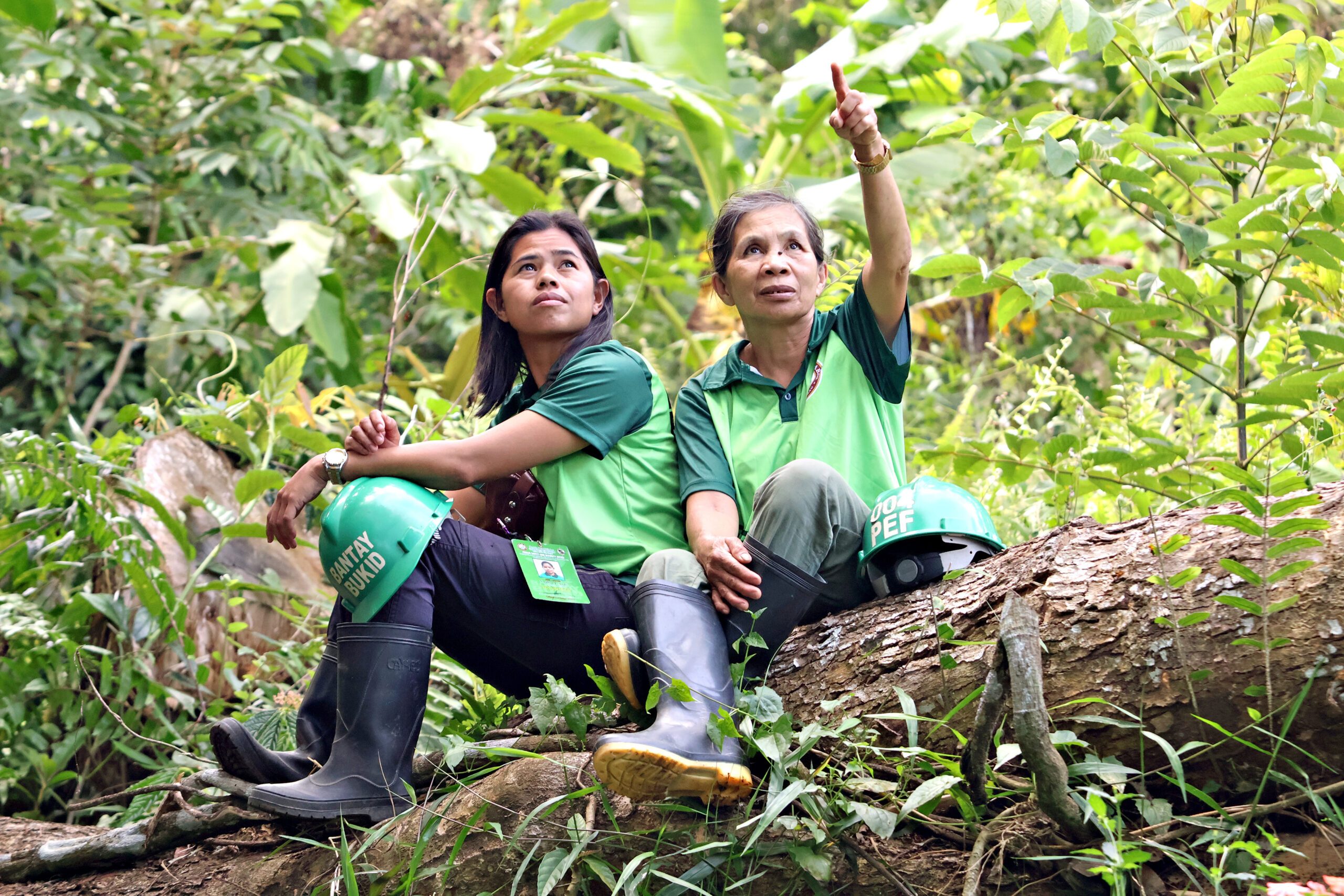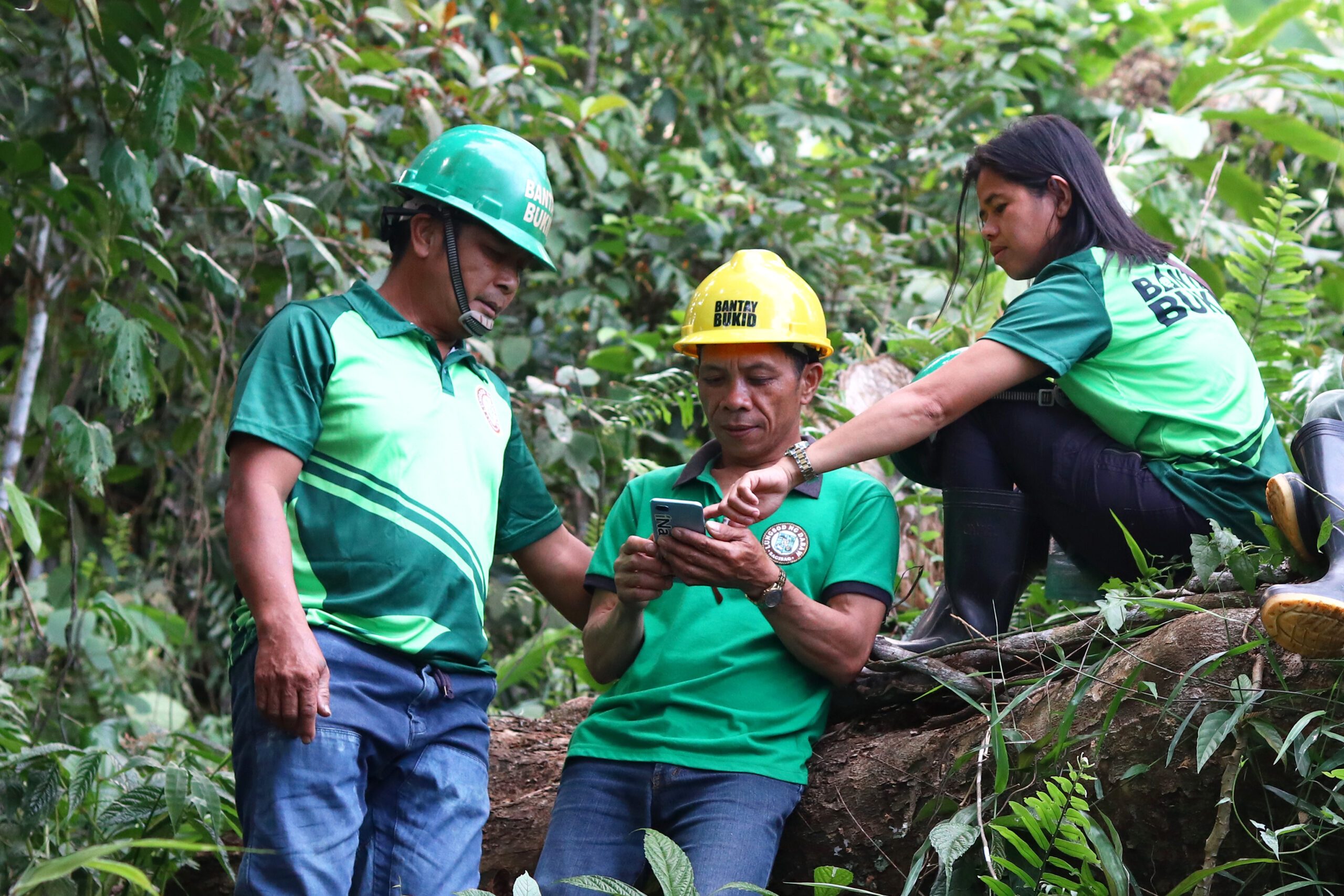SUMMARY
This is AI generated summarization, which may have errors. For context, always refer to the full article.

DAVAO, Philippines – In the rugged landscapes of Davao City, Analou Anto, a 34-year-old indigenous woman from Barangay Sibulan, Toril District, navigates the dense forests fraught with peril – from the formidable presence of wildlife to the precarious terrain and the looming threat of illegal logging.
For about four years, Anto has been leading a male-dominated group, known as “Bantay Bukid” (forest watch), through the depths of their ancestral lands, undeterred by the challenges to safeguard their natural treasures.
“Going into the forest is challenging and risky. Dangers lurk everywhere – from wild animals to treacherous terrain, added by unpredictable weather and threats from illegal loggers,” said Anto, a member of the Bagobo Tagabawa tribe.

Each month, her team renders 10 days to patrolling a strictly protected zone, a delineated area within their 4,000-hectare ancestral domain located at the Mount Apo Key Biodiversity Area which houses the oldest sanctuary of the critically endangered Philippine eagle, as well as the Sibulan River. The river is one of Davao’s eight watersheds that provide potable water to about 1.7 million residents.
Anto’s routine involves getting up at dawn to do household chores and getting her only daughter ready for school. Then, she hops on her motorcycle for an hour-long drive to meet up with 14 other forest guards at the drop-off point to start their patrol.
Clad in rubber boots, they assemble before starting their trek through steep, mountainous terrain. But their actual work doesn’t start right away. From the drop-off point, they have to trek for another two hours to get to their patrol area.
In the wilderness, they perform various tasks – they document endemic wildlife and plant species, search for signs of poaching and logging, and track evidence of deforestation which they report to government authorities.
The group also manages nurseries, replants trees by the thousands, and performs community services.
Anto said she became a forest guard in 2020 due to COVID-19 pandemic travel restrictions, redirecting from her previous job as a maid abroad. Her leadership skills quickly earned her the role of team leader among the forest guards in Salaysay, where she stands as one of only three women in the cohort.
“We’ve never felt being underestimated in the group just because we’re women. They’ve never seen us as a burden at work. And as the team leader, it empowers me to know that the leadership I offer and my voice matter to them,” she said.
Form of empowerment
Balancing motherhood and forest guarding can be tough, but the single mother sees both roles as having the same duty: caring for nature as she would for her child.
On her regular days, Anto sells merchandise online and makes native coffee for sale. She also buys vegetables from her friend’s farm and resells them at retail prices to the neighborhood.
She said the income from selling goods sometimes falls short of meeting the family’s needs.
As a single mother, she views the honorarium she receives as a form of “women empowerment” as it helps her earn additional income to support herself and her daughter.
Each Sibulan forest guard receives a monthly honorarium of P3,500 for every 10 days of patrol work.

Iron lady
In Barangay Salaysay in the Marilog District, home to the Obu Manuvu tribe, another indigenous woman leads the group of forest guards.
Mabel Monkal, 32, is not only handling secretarial duties but also stepping up to lead patrols into the deepest parts of the forest.
Her colleagues often describe her as an “iron lady” for fearlessly confronting encroachers and illegal loggers.
When she joined the forest guards in 2021, there were only three women among the 28 members. Now, there are seven of them.
“We walk 18 kilometers, which takes about four hours. Sometimes we have to cross rivers and get wet. There are times we encounter storms, and get into accidents like falling into the cliff,” Monkal said.
Monkal and the other forest guards protect Mounts Makabol-Alikoson Conservation Area (MMACA), an 8,819-hectare conservation area crucial for the livelihoods of over 6,000 residents of Salaysay.
According to the Sustainable Davao Movement, MMACA is home to an ancient nesting site of a Philippine eagle pair, which has raised at least a dozen eagles since 1986. It also hosts other threatened wildlife species and around 40 bird species.
Monkal explained that MMACA overlaps with their ancestral domain, where endangered wildlife and habitats are sanctified as pusaka. For the Obu Manuvu, pusaka embodies the philosophy of securing cherished cultural items, animals, and lands as sacred and very important.
Facing threats
To protect these sacred lands, forest guards endure the hardships of patrolling the mountains, facing threats from encroachers and illegal loggers.
Despite the threats, Monkal said it’s the rampant illegal logging that fuels her passion to continue forest guarding.
In 2021, Monkal and her fellow forest guards uncovered the cutting of century-old trees in the MMACA by a landowner with a Private Land Timber Permit (PLTP) issued by the Department of Natural Resources-Davao (DENR). It allowed them to cut 121 century-old trees to pave the way for land development.
Their report triggered protests from environmental groups and an online campaign, urging the DENR to cancel the permit to protect MMACA.
Due to pressure from petitions, the DENR-Davao announced on December 9, 2021, that the landowner had voluntarily ceased tree cutting and promised to issue a suspension order for the PLTP. However, no formal suspension order was issued, and the tree cutting only stopped because the permit expired on December 18, 2021.
Environmental groups in Davao City, such as the Philippine Eagle Foundation (PEF), believe that if it weren’t for the report from the forest guards of Salaysay, the impact of devastation would have been even greater.
Inclusive work
PEF collaborates with indigenous communities who live in the forest home of the Philippine eagle, as part of their culture-based conservation program.
Jayson Ibañez, director for operations at PEF, emphasized the importance of inclusivity in conservation, noting that “women, with their caring nature, excel in nature-based work and conflict resolution.”
“We see that they demonstrate competence in various tasks, from patrols to nursery management. We’re very happy about their involvement, affirming our belief that forest guarding is not only for men but equally for women,” Ibañez said.
Encouraging others
Both Anto and Monkal said they believe that there’s much more to be done in making conservation efforts inclusive, and they hope that by sharing their stories of indigenous women leading the way, more will join their ranks.
“Nurturing and caring for our environment isn’t solely the responsibility of one gender – it’s our collective obligation,” Anto said. –Rappler.com
Ivy Marie Mangadlao is a community journalist writing for Mindanews and an Aries Rufo Journalism fellow for 2023-2024. This article was written with the support of Oxfam Pilipinas.
Add a comment
How does this make you feel?




![[Pastilan] The Great Philippine Identity Sale](https://www.rappler.com/tachyon/2024/07/great-philippine-identity-sale-july-16-2024.jpg?resize=257%2C257&crop=486px%2C0px%2C1080px%2C1080px)










![[OPINION] Unpaid care work by women is a public concern](https://www.rappler.com/tachyon/2024/07/20240725-unpaid-care-work-public-concern.jpg?resize=257%2C257&crop_strategy=attention)




There are no comments yet. Add your comment to start the conversation.